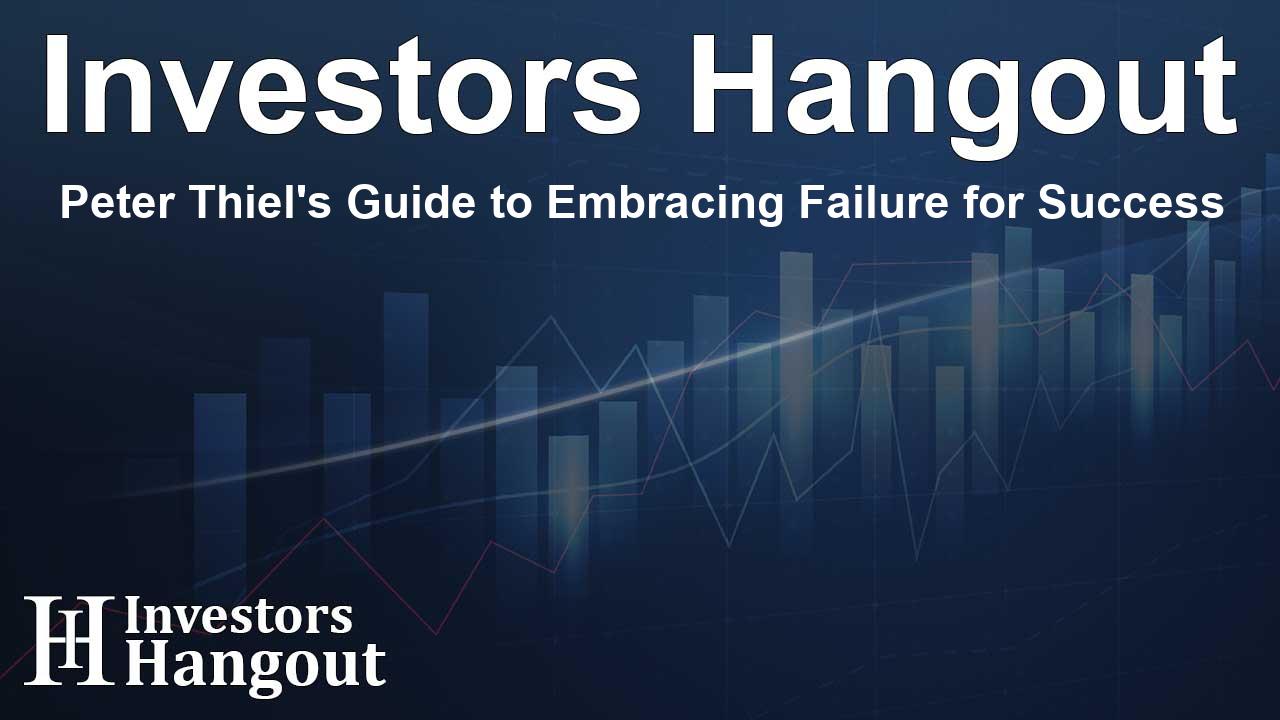Peter Thiel's Guide to Embracing Failure for Success

Learning from Failure: Peter Thiel's Perspective
Peter Thiel advocates that in the journey toward success, setbacks are not the end. Instead, he views early failures as opportunities for growth and progress. This attitude can empower entrepreneurs, allowing them to explore multiple avenues toward success.
Transforming Setbacks Into Opportunities
In a recently revisited interview, Thiel shared his belief that initial failures can serve as crucial materials for refining ideas, rather than acting as roadblocks. Reflecting on his time with PayPal, he highlighted how the company's initial focus on an infrared money transfer device for Palm Pilots encountered skepticism.
The Importance of Iteration
Thiel recalled that the original concept was deemed one of the worst business ideas of 1999. However, he emphasized that this did not deter him or his team. Instead, they used the rejection to innovate, highlighting the necessity of adapting and iterating on ideas to achieve success.
Evolution of PayPal: A Shift in Strategy
The shift from IR money transfers to email-based payments marked a pivotal moment for PayPal. Thiel acknowledged the team’s agility in redirecting their approach, which was significantly enhanced by the arrival of David Sacks. This transition ultimately allowed PayPal to seize new opportunities, particularly among eBay sellers.
Building a Strong Team
Sacks' experience and vision were instrumental in this transition, guiding the company to focus on simplicity and accessibility. The ability to pivot and adapt was vital, proving that a dedicated team can pivot successfully even after early hiccups.
Resilience as a Core Principle
Thiel's views on resilience echo the philosophies of other successful entrepreneurs. For instance, Jeff Bezos has often stated that successful innovation often arises from high-quality failures. He encourages businesses to scale the size and scope of their experimental failures, recognizing that learning from missteps is critical to achieving greater success.
Not Afraid to Fail
Similarly, Mark Cuban posits that the scoreboard only needs one successful venture to validate countless failures. He reinforces that embracing the possibility of failure is essential for success. Like Thiel, he believes that the willingness to fail often paves the way for eventual triumph.
Conclusion: The Power of Persistence
In summary, embracing failure and fostering resilience are crucial components of entrepreneurial success. By adopting these principles, individuals can navigate the challenges of business with greater confidence and adaptability. Ultimately, the notion that one must seize every chance to learn from setbacks is at the heart of an innovative mindset.
Frequently Asked Questions
What is Peter Thiel's main belief about failure?
Peter Thiel believes that failure should be viewed as a stepping stone toward success, allowing entrepreneurs numerous opportunities to succeed if they persistently iterate and adapt.
How did PayPal evolve from its initial idea?
PayPal shifted its focus from an infrared device for money transfers to email payments after realizing the larger market potential, particularly among eBay users.
Who was important in PayPal's pivot strategy?
David Sacks played a crucial role in redirecting PayPal's strategy, helping the company capitalize on online payment solutions.
What do other entrepreneurs say about failure?
Entrepreneurs like Jeff Bezos and Mark Cuban emphasize the value of learning from failure and stress the importance of resilience in achieving long-term success.
How can someone apply Thiel's principles to their endeavors?
By embracing failures as learning opportunities and continuously adapting their approach, individuals can enhance their chances of finding success in their entrepreneurial pursuits.
About The Author
Contact Olivia Taylor privately here. Or send an email with ATTN: Olivia Taylor as the subject to contact@investorshangout.com.
About Investors Hangout
Investors Hangout is a leading online stock forum for financial discussion and learning, offering a wide range of free tools and resources. It draws in traders of all levels, who exchange market knowledge, investigate trading tactics, and keep an eye on industry developments in real time. Featuring financial articles, stock message boards, quotes, charts, company profiles, and live news updates. Through cooperative learning and a wealth of informational resources, it helps users from novices creating their first portfolios to experts honing their techniques. Join Investors Hangout today: https://investorshangout.com/
The content of this article is based on factual, publicly available information and does not represent legal, financial, or investment advice. Investors Hangout does not offer financial advice, and the author is not a licensed financial advisor. Consult a qualified advisor before making any financial or investment decisions based on this article. This article should not be considered advice to purchase, sell, or hold any securities or other investments. If any of the material provided here is inaccurate, please contact us for corrections.
